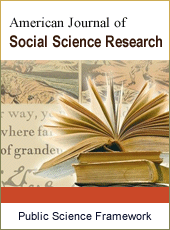American Journal of Social Science Research
Articles Information
American Journal of Social Science Research, Vol.1, No.5, Dec. 2015, Pub. Date: Sep. 26, 2015
Investigating the Relationship Between Literacy and Health Level in Rural Women Case Study; The Rural Women of Kermanshah, Iran
Pages: 282-289 Views: 3689 Downloads: 1152
[01]
Habil Heidarkhani, Department of Sociology, Kermanshah Branch, Islamic Azad University, Kermanshah, Iran.
[02]
Sepideh Hazrati, Department of Sociology, Dehaghan Branch, Islamic Azad University, Dehaghan, Iran.
[03]
Zahra Alizadeh, Department of Educational Sciences, Payame Noor University, Tehran, Iran.
Health promotion and protection of public health is an important element of a society's development. Considering women's health is important as the foundation of families' and societies' health. Women's health includes physical, psychological, social, cultural, emotional and spiritual well-being influenced by physiological, social, economic and political factors. One of the most important social factors affecting women's health is literacy or education level. This factor is very important especially among rural women as those having less accessibility to various facilities. The present study is an applied, extensive, micro level and a cross-sectional study. The research's methodology is field study performed with survey techniques by using questionnaire in order to collect data. The statistical population in this study consists all upper 18-aged rural women in Kermanshah, which 382 subjects of them were studied using multi-stage sampling as the case study. The findings suggest that there is a significant relationship between women's literacy and health level in all aspects. This means that as women's literacy level is increased and various modern technologies are used, physical problems, social dysfunction, depression, anxiety and insomnia/sleeplessness is reduced. As a result, as the levels of education or literacy are enhanced, women's health will have a significant increase in all dimensions. It is essential that authorities in the field of women's health do not only concentrate their programs on urban health, rural health should be paid more attention. They also should provide higher levels of education and familiarity with new technologies for rural women.
Health, Women's Health, Education/Literacy, Rural Women, Technology
[01]
Bond, J. & Lane, C. (2010). Quality of life and the elderly. Translated by Hussein Mohaqeqi Kamal. Tehran, Danzheh publication.
[02]
Khodarahimi, S. (1995). The concept of psychological health, Mashhad, Javidan Xerad publication.
[03]
Soleimani Zadeh, L. et al. (2006). The study of college students' mental health at university centers in the city of Bam, Iran. Medicine and purification, No.14, Summer.
[04]
Shafi Abadi, A. & Naseri, Gh. (2001). Theories of counseling and psychotherapy. Tehran, University Publishing Centre.
[05]
Qorbani, A. & Golchin, M. (2011). ""The mental health status of women consulting with the health centers of Qazvin province"". Journal of Qazvin University of Medical Sciences. Volume 5, Number 1.
[06]
Ganji, H. (2000). Mental Hygiene, Tehran; Arasbaran publication.
[07]
Nejat, H. (1999). Mental health in schools of psychology. Journal of Mental Health, No. 3rd, the first year, fall.
[08]
Noori, M. et al. (2003). Assessing the mental health of women heads of household. Rehabilitation, Volume 4, Number 2.
[09]
Goldberg, D. & Williams, P. (1988). A users' guide to the General Health Questionnaire. U. K., NFER Nelson.
[10]
Ibanez E.l. Municipality, (2011). space and the social determinants of health. Environment and Urbanization; 23, 113-17.
[11]
Mari, J. J. & Williams, P. (1985). A comparison of the validity of two psychiatric screeing questionnaires in Brazil using ROC analysis, Psychological Medicine, 15, 651-9.
[12]
Noorbala AA, Bagheri yazdi SA, Mohammad K. (2009). The Validation of General Health Questionnaire- 28 as a Psychiatric Screening Tool. Hakim Research Journal, 11(4). pp, 47- 53. [text in Persian].
[13]
World Health Statistics. contains WHO's annual compilation of data from its 193 member states, 2010. http,//www.who.int/whosis/whostat/2010/en/.
[14]
Taghavi, Seyed Mohammad Reza. (2001). Reliability and validity of the General Health Questionnaire (GQH). Journal of Psychology 20, 398-381. Persian.
[15]
Veenstra. G. (2000). Social capital, SES and health, an individual – level analysis. Social science & medicine 50, 619 – 629.
[16]
Woolcock, Michael. (2001). ""The place of social capital in understanding social and economic outcome"". Canadian journal of policy researches.
[17]
Goldberg, D. & Williams, P. (1988). A users' guide to the General Health Questionnaire. U. K. , NFER Nelson.
[18]
Ibanez E.l. Municipality, (2011). space and the social determinants of health. Environment and Urbanization; 23, 113-17.
[19]
Mari, J. J. & Williams, P. (1985). A comparison of the validity of two psychiatric screeing questionnaires in Brazil using ROC analysis, Psychological Medicine, 15, 651-9.
[20]
Noorbala AA, Bagheri yazdi SA, Mohammad K.(2009). The Validation of General Health Questionnaire - 28 as a Psychiatric Screening Tool. Hakim Research Journal, 11(4). pp, 47- 53. [text in Persian].
[21]
World Health Statistics. contains WHO's annual compilation of data from its 193 member states,2010. http,//www.who.int/whosis/whostat/2010/en/.
[22]
Taghavi, Seyed Mohammad Reza. (2001). Reliability and validity of the General Health Questionnaire (GQH). Journal of Psychology 20, 398-381. Persian.
[23]
Veenstra. G. (2000). Social capital, SES and health, an individual – level analysis. Social science & medicine 50, 619 – 629.
[24]
Woolcock, Michael. (2001). ""The place of social capital in understanding social and economic outcome"". Canadian journal of policy researches.

ISSN Print: 2381-7712
ISSN Online: 2381-7720
Current Issue:
Vol. 7, Issue 3, September Submit a Manuscript Join Editorial Board Join Reviewer Team
ISSN Online: 2381-7720
Current Issue:
Vol. 7, Issue 3, September Submit a Manuscript Join Editorial Board Join Reviewer Team
| About This Journal |
| All Issues |
| Open Access |
| Indexing |
| Payment Information |
| Author Guidelines |
| Review Process |
| Publication Ethics |
| Editorial Board |
| Peer Reviewers |


